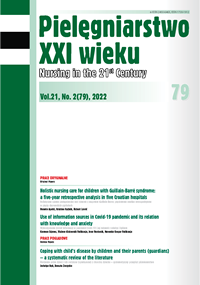Ocena stresu rodziców dzieci niepełnosprawnych i bez niepełnosprawności – badanie pilotażowe
DOI:
https://doi.org/10.2478/pielxxiw-2022-0018Słowa kluczowe:
niepełnosprawność, dziecko, stres, rodzice, PSI 4 SFAbstrakt
OCENA STRESU RODZICÓW DZIECI NIEPEŁNOSPRAWNYCH I BEZ NIEPEŁNOSPRAWNOŚCI – BADANIE PILOTAŻOWE
Cel. Celem pracy było określenie poziomu stresu rodziców opiekujących się dzieckiem z niepełnosprawnością oraz rodziców dzieci pełnosprawnych.
Metody. Badanie pilotażowe trwało od października do listopada 2020 r. W badaniu wzięło udział 40 rodziców dzieci niepełnosprawnych i 40 rodziców dzieci pełnosprawnych. Jako narzędzie badawcze wykorzystano krótki formularz Parenting Stress Index 4 w wersji czeskiej (PSI 4 SF).
Wyniki. Stwierdzono, że rodzice dzieci z niepełnosprawnościami wykazują duży stres w porównaniu z grupą rodziców dzieci pełnosprawnych. Różnica w odczuwaniu stresu między grupami monitorowaną i kontrolną jest istotna statystycznie (p<0,001) we wszystkich podskalach oraz w ocenie ogólnej.
Wnioski. Opieka nad dzieckiem niepełnosprawnym wiąże się z dużym stresem. Pracownicy służby zdrowia powinni sporządzić mapę stresu rodzicielskiego i zaoferować rodzicom profesjonalną pomoc w opiece nad dzieckiem w razie potrzeby
Bibliografia
1. Secco ML, Askin D, Yu CT, et al. Factors aff ecting parenting stress among biologically vulnerable toddlers. Issues in Comprehensive Pediatric Nursing. 2006; 29(3), 131- 156.
2. Sobotková I. Psychologie rodiny. 2. vyd. Praha: Portál, 2007.
3. Anthony LG, Anthony JB, Glanville DN, et al. The relationships between parenting stress, parenting behavior and preschoolers’ social competence and behavior problems in the classroom. Infant and Child Development. 2005; 14(2): 133-154.
4. Kurucová R. Zátěž pečovatele. 1. vyd. Praha: Grada; 2005.
5. Miller AC, Gordon RM, Daniele RJ, et al. Stress, appraisal and coping in mothers of disabled and non disabled children. Journal of Pediatric Psychology. 1992; 17(5): 587-605.
6. Perry A, Sarlo-Mc Garvey N, Factor DC. Stress and family functioning in parents of girls with Rett syndrome. Journal of Autism and Developmental Disorders. 1992; 22(2): 235-248.
7. Brinchmann BS. When the home becomes a prison: Living with a severely disabled child. Nurs Ethics. 1999; 6(2): 137-143.
8. Lisanti AJ. Parental Stress and Resilience in Congenital Heart Disease: A New Frontier for Health Disparities Research. Cardiol Young. 2018; 28(9): 1142-1150.
9. Haverman L, Avan Oers H, Maurice-Stam H, et al. Health related guality of life and parentel perceptions of child vulnerability among parents of a child with juvenile idiopathic arthritis: results from a web-based survey. Pediatric Rheumatol Online J. 2014; 7: 12-34.
10. Lisanti AJ, Vittner D, Medoff -Cooper B, et al. Individualized Family Centered Developmental Care: An Essential Model to Address the Unique Needs of Infants with Congenital Heart Disease. Journal of Cardiovascular Nursing. 2019; 34(1): 85- 93.
11. Abidin RR. Parenting Stress Index-Professional Manual. Florida Ave PAR. 2012.
12. Miranda A, Mira A, Berenguer C. Parenting Stress in Mothers of Children With Autism Without Intellectual Disability. Mediation of Behavioral Problems and Coping Strategies. Frontiers in Psychology. 2019; 8(3): 3-12.
13. Al-Eithan M, Al Juban H, Robert AA. Dissociative experiences and their relationship to mood problems among Arab mothers of disabled children. The Pan African Medical Journam. 2013; 15: 21.
14. Woodgate RL, Edwards M, Ripat JD, et al. Intense parenting: a qualitative study detailing the experiences of parenting children with complex care needs. BMC Pediatrics. 2015; 15: 197.
15. Giovagnoli G, Postorino V, Fatta LM, et al. Behavioral and emotional profi le and parental stress in preschool children with autism spectrum disorder. Research In Developmental Disabilities. 2015; 45-46; 411-421.
16. Hunt X, Laurenzi Ch, Skeen S, et al. Family disability, poverty and parenting stress: Analysis of a cross-sectional study in Kenya. African Journal of Disability. 2021; 10.
17. Stepney C, Kane K, Bruzzese JM. My child is diagnosed with asthma, now what?: motivating parents to help their children control asthma. The Journal Of School Nursing: The Offi cial Publication of The National Association of School Nurses. 2011; 27(5), 340-347.
Pobrania
Opublikowane
Numer
Dział
Licencja
Prawa autorskie (c) 2022 Autorzy

Utwór dostępny jest na licencji Creative Commons Uznanie autorstwa 4.0 Międzynarodowe.




